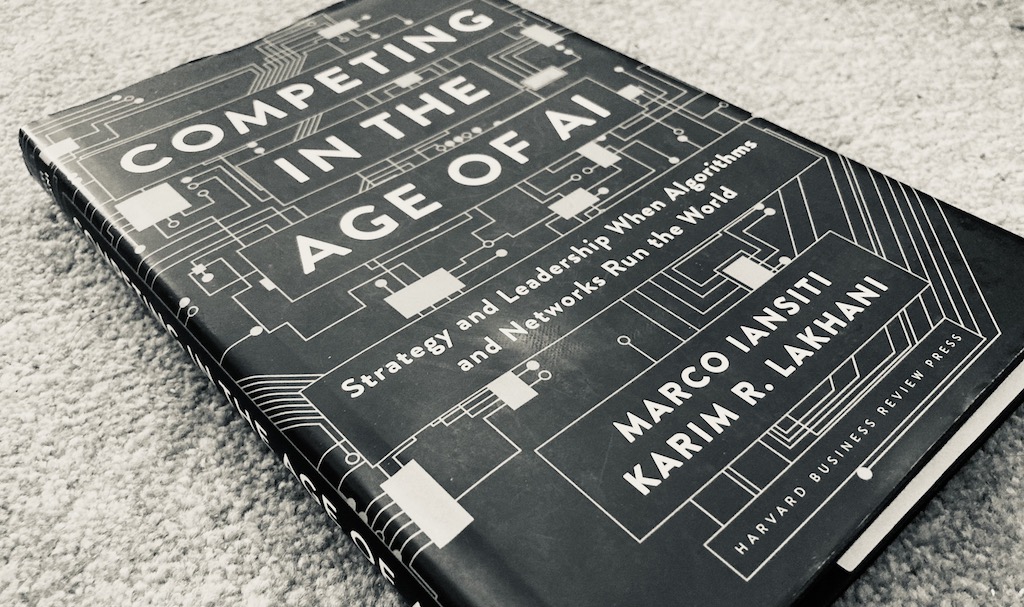Dev Book Review: Competing in the Age of AI

Competing in the Age of AI: Strategy and Leadership When Algorithms and Networks Run the World by Marcho Iansiti and Karim R. Lakhani. ISBN 978-1-63369-762-1.
Data-driven decision making in companies is not a new field of endeavor, but in recent times it has exploded in importance, driven along with the uptake of cloud computing and abundant, cheap, storage. I'm currently being swept along with this myself, changing career direction and reskilling as a data engineer, and it's in this context that one of my new colleagues lent me this book.
Big Data provides a lot of opportunity for gaining insights that can be used to improve decision making within an organisation, but the bigger it is and the faster it flows the more important some level of automation in the gathering of insights and process of making decisions is. AI (in a broad sense) is being increasingly leveraged here, also helped by the rise in related technologies being made available in the aforementioned cloud platforms.
One thing to be clear about is that this isn't a tech book, nor is it meant to be. It never gets into the details of what is meant by AI, which is often a handy catch-all phrase that can cover anything beyond the most straightforward of algorithms. For the purposes of this book, this doesn't really matter; being an Harvard Businesss Review publication, the target audience is "leaders". I'm not a leader in the HBR sense, but as engineers we shouldn't just be reading technical books - gaining an understanding of the wider context, and of other types of roles that we must interact with, only helps us and our teams be more effective, as does knowing what our leaders are being told when they read books like this.
From that perspective, I think this book does a decent job. The level of technical detail is appropriate, and nothing stood out as jarringly wrong apart from the occasional over-simplification. I would not wince and start thinking about damage control if I were to see this on a senior manager's desk.
In large part it's yet another book that owes a large debt to Conway's Law (and he is namechecked), in that it's about how the structure of a company itself needs to be very different if it is to successfully become data-driven and leverage AI; you cannot just take a traditional company and sprinkle in some data and machine learning, committed organisational transformation is required and the authors back this up well with lots of case studies, including some notable failures.
In terms of some of the org structures it is suggesting, it's a mixed bag; some of the ideas align well with Team Topologies, but the ideas around data are already dated - it's very much treated as a separate concern, often represented as one big black block labeled "data" distinct from the "Agile delivery teams", in stark contrast to currently in-vogue ideas like Data Mesh. This doesn't really invalidate what the authors are saying, however, it's more a slight distraction, and given the lead time for writing and publishing a book compared to how quickly ideas like Data Mesh can take root it's entirely understandable.
Less understandable for me while reading it was all the dry descriptions of how data-driven companies are changing jobs and society with no consideration to whether or not these are a net positive. I was slightly relieved to eventually get to a chapter on ethics near the end, where the authors do tackle the topic and make some good points, but at the same time I don't believe it should have been compartmentalised in this way. It makes it all the easier for a "leader" to skip; I strongly believe that ethical considerations should be ever-present when anyone with power are making decisions (by which I don't just mean leaders, but the anyone involved in the day-to-day work - we are continually making decisions, and no decision is without impact) and it's best if this is constantly remembered and built-in to a process and not just tacked on at the end (if there's time).
It's overall a decent read. The authors back up their ideas well with case studies and data, and it feels like a thorough, well-written introduction for leaders new to the topic and non-leaders who want to understand the reasons behind these kinds of strategies and organisational transformations.